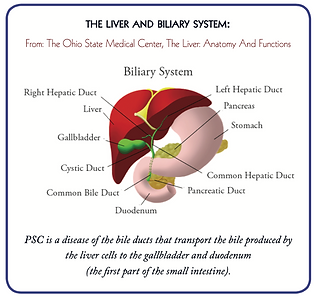PRIMARY SCLEROSING CHOLANGITIS
PATIENT REGISTRY
Supported browsers: Chrome, Edge, and Safari
About PSC

What: Primary Sclerosing Cholangitis (PSC) is a rare liver disease that damages the bile ducts inside and outside the liver. With PSC, bile ducts are inflamed, and the inflammation leads to scarring and narrowing of the affected ducts. Eventually, blockages may occur. As the scarring blocks more and more ducts, bile becomes trapped in the liver. Such blockages damage the liver and can result in fibrosis and cirrhosis of the liver and liver failure. Patients may eventually require a liver transplant. Aside from transplant, there currently are no approved treatments to stop or slow the progression of PSC.
PSC often occurs with inflammatory bowel disease (IBD), most often ulcerative colitis (UC) and sometimes Crohn’s disease. It is estimated that more than 75 percent of PSC patients have IBD. PSC also is associated with other autoimmune diseases.
Who: PSC can affect all ages and genders, but affects about twice as many males as females. PSC is most common in northern European countries. A reliable epidemiological estimate of the total world population of PSC patients is not well established; however, it is estimated that there are more than 30,000 PSC patients in the United States, 3,000 in Canada, and 10,500 in the UK.
Causes: Although no one knows the causes of PSC, exciting research is underway to better understand the disease, develop more effective treatments, and, eventually, find a cure. This registry aims to facilitate and accelerate this research. Visit the Registry Impact page to see Registry participant data at work in research.

More Information: Please visit the PSC Partners website at www.pscpartners.org for a comprehensive and trusted source of information about PSC. You will find resources for patient and caregiver support, as well as links to patient support groups outside the US.
